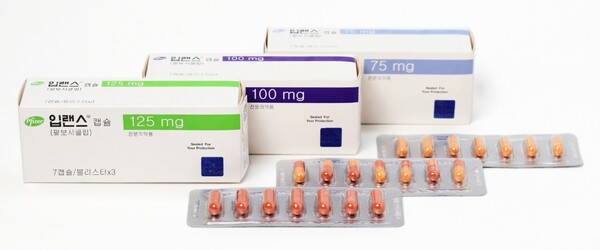Pfizer's first-in-class CDK4/6 inhibitor, Ibrance (palbociclib), has received an expanded indication in Korea.
It can now be used as first-line endocrine therapy in patients with hormone receptor-positive and human epidermal growth factor receptor 2-negative (HR+/HER2-) advanced or metastatic breast cancer, regardless of menopausal status.
On July 4, the Ministry of Food and Drug Safety (MFDS) approved the expansion of Ibrance’s indication to include “combination therapy with an aromatase inhibitor for first-line endocrine therapy in premenopausal HR+/HER2- advanced or metastatic breast cancer patients.”

That expanded the drug’s indication from postmenopausal to all women. Premenopausal and perimenopausal women taking Ibrance in combination with endocrine therapy should receive a luteinizing hormone-releasing hormone (LHRH) agonist, according to clinical treatment guidelines.
The domestic approval was based on a comprehensive review of phase 3 clinical trials and Real-World Evidence (RWE).
The Young-PEARL study, the only clinical trial to test Ibrance as a first-line endocrine therapy in premenopausal patients with metastatic breast cancer, was particularly significant as it was conducted by Korean researchers at the Breast Cancer Division of the Korean Cancer Society Group (KCSG) at 14 institutions in the country.
The study followed 189 premenopausal patients aged 19 and older with HR+/HER2- breast cancer that had recurred or progressed during previous tamoxifen treatment for 17 months.
Results showed that median progression-free survival (mPFS) was prolonged to 20.1 months in the Ibrance-endocrine therapy group combined with leuprolide compared to 14.4 months in the conventional chemotherapy group, reducing the risk of disease progression by 34 percent.
The trial was a prospective study comparing the combination of a CDK4/6 inhibitor and endocrine therapy to chemotherapy in premenopausal breast cancer patients in Korea. Last December, the U.S. Food and Drug Administration also expanded its approval for Ibrance to premenopausal patients, considering various data, including the Korean trial.
In Korea, the share of young breast cancer patients who are premenopausal or under 40 years old is 10.5 percent, twice as high as in the West. Young premenopausal patients have a higher rate of breast cancer progression and a poorer prognosis, so there is a high demand for new treatment options among patients and medical professionals.
"Having breast cancer during a period of high economic activity can be devastating for patients and society, but treatment options for these patients have been very limited," Professor Park Yeon-hee of the Department of Hematology/Oncology at Samsung Medical Center, who led the Young-PEARL study. "We are very pleased to contribute to developing treatments that consider population diversity and establishing health equity through the Korea-oriented Young-PEARL study."
Maiko Sato, executive vice president and head of oncology business unit at Pfizer Korea, said, "We are grateful to the government and researchers for their support in extending the approval of Ibrance to the premenopausal population in Korea where the age of breast cancer incidence is lower than in the West.”
Sato added that the company would continue to build on its strong leadership in breast cancer care to improve the treatment landscape in Korea and make a difference in more patients' lives.

